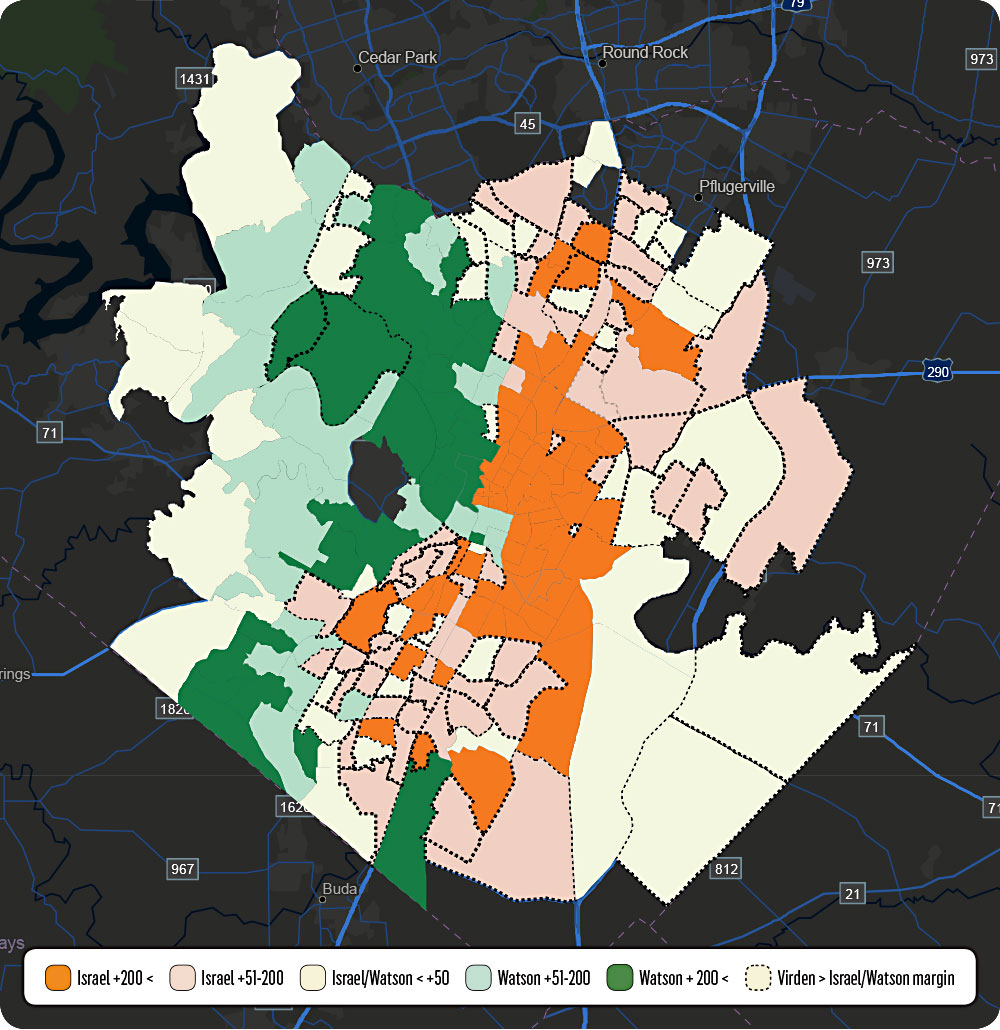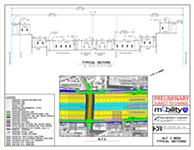Austin at Large: Tale of Two Cities
Mayor’s race: Hook ’em along I-35, sic ’em along MoPac
By Mike Clark-Madison, Fri., Nov. 18, 2022

UT-Austin alumna Celia Israel and Baylor grad Kirk Watson – each represented on this map in their school colors – divided up the city somewhere around Lamar Boulevard. The outgoing North Austin state rep bested the former mayor and state senator by just over 16,000 votes, or 5.5%. With about 44% of city voters casting a ballot in the mayor's race (still kind of a guess, but less than the 52.2% turnout for Travis County as a whole), third-place finisher Jennifer Virden's 18% – more than 52,000 votes – was higher than many preelection prognosticators expected.
The results suggest Watson fought a two-front war to hold onto westside support against Virden in his best precincts along MoPac, while keeping Israel from running up the score too resoundingly in her strong boxes. Results? The dark green boxes on the map represent a 14,500-vote surplus for Watson over Israel (and 16,165 votes for Virden), but the dark orange boxes delivered a nearly 27,000-vote margin for Israel over Watson, and only 11,424 votes for Virden.
None of this forms an insurmountable gap for Watson to close by Dec. 13, since he has a lot of money to spend on voter contact and "get out the vote" efforts; his strongest boxes turn out at higher rates in most elections than do the Central and Eastside precincts where Israel romped; and there are more Virden voters up for grabs on Watson's side of town. However! Dec. 13 is not a very long way away – early voting begins the week after Thanksgiving – and there are capacity constraints to how quickly Watson can spend $2 million or so. Plus, Kirk Watson is not one of these lightly affiliated problem-solver types of Democrats who can easily sweep up the votes of partisan Republicans who found Virden appealing and who can always just skip the run-off. Israel's path to victory is longer but less complicated from that perspective; she can focus 95% of her energy simply on mobilizing people who already voted for her, rather than trying to persuade about a third of the ones who didn't.
In the last open-seat mayor's race in 2014, run-off turnout was about 15%, after a general election turnout of just over 40%. Steve Adler, running on property tax relief then as Virden did this year, led Mayor Pro Tem Mike Martinez by about 7 points in the first round, then prevailed in the run-off by a 2-to-1 margin.
North-South Divides in City Council Races
In each of the three open-seat council districts going to run-off, there are also easy-to-spot geographic splits, cleaving north from south instead of east from west. In District 3, the dividing line between José Velásquez's and Daniela Silva's strongest boxes was the river, with Velásquez prevailing from East Cesar Chavez through Holly (his own neighborhood) and over into Montopolis, and Silva ruling the roost along East Riverside and Oltorf. In District 5, Ryan Alter reaped substantial support along South Congress, South First, and South Lamar down to Ben White or so, but Stephanie Bazan earned enough votes from far-South Austin to put her in first place.
As for the eight-way District 9 battle, different candidates each claimed major nodes in the district that includes Downtown (mostly won by Greg Smith), old-skool Birkenstock Belt neighborhoods like Hyde Park and Bouldin and Hancock (mostly won by Linda Guerrero), the more urbanist Mueller/Cherrywood/Manor Road axis (where Ben Leffler was strongest, along with Clarksville and D9's stretch of East Riverside), and UT and West Campus, where Zohaib Qadri racked up more than 6,000 votes just among the student precincts. That was more than half of his total, as he led Guerrero into the run-off by more than 2,700 votes.
City Council Run-off Election:
Early voting: Dec. 1-9
Election day: Tue., Dec. 13
Got something to say? The Chronicle welcomes opinion pieces on any topic from the community. Submit yours now at austinchronicle.com/opinion.







